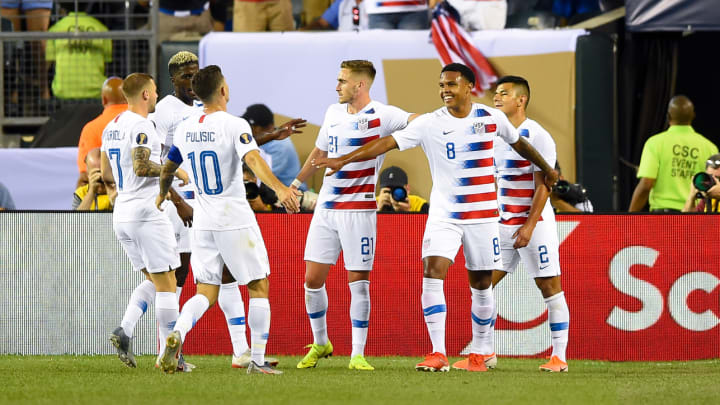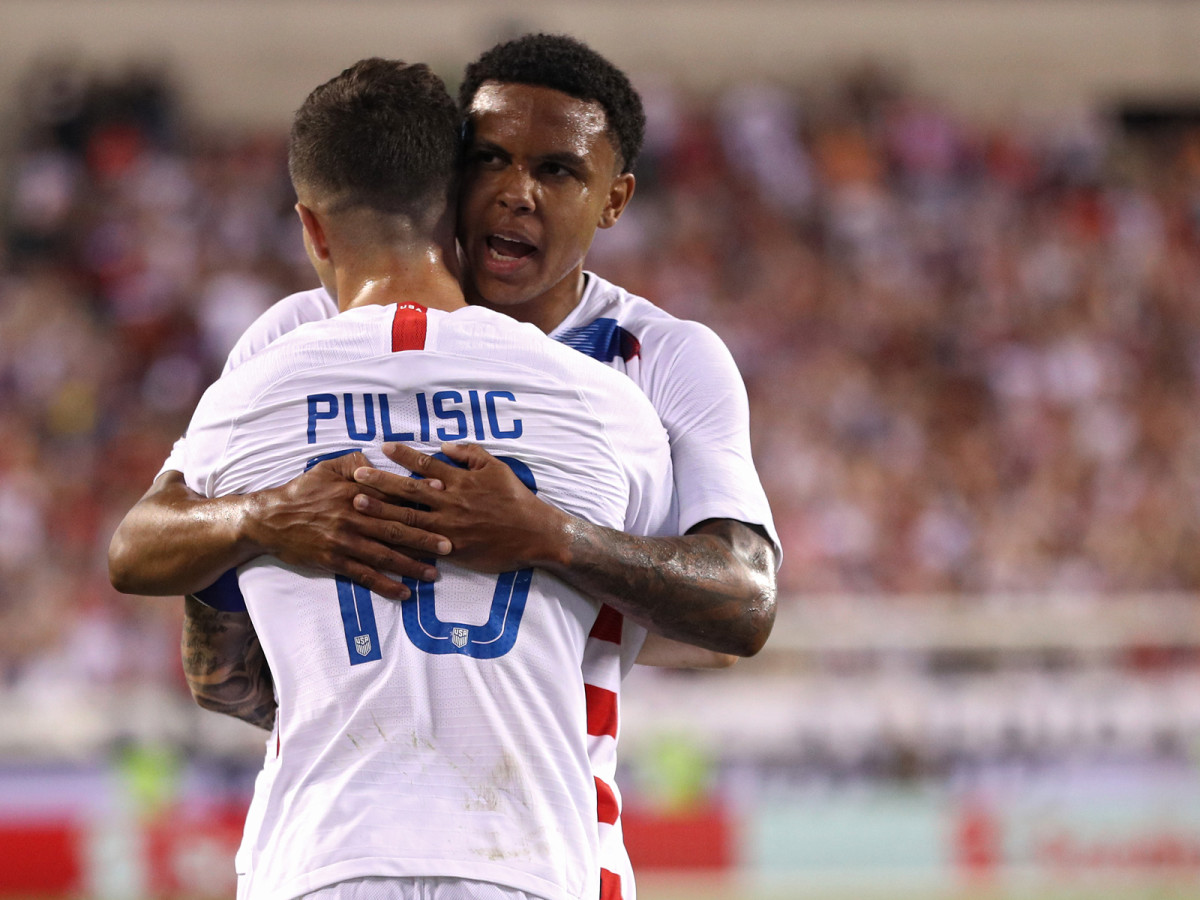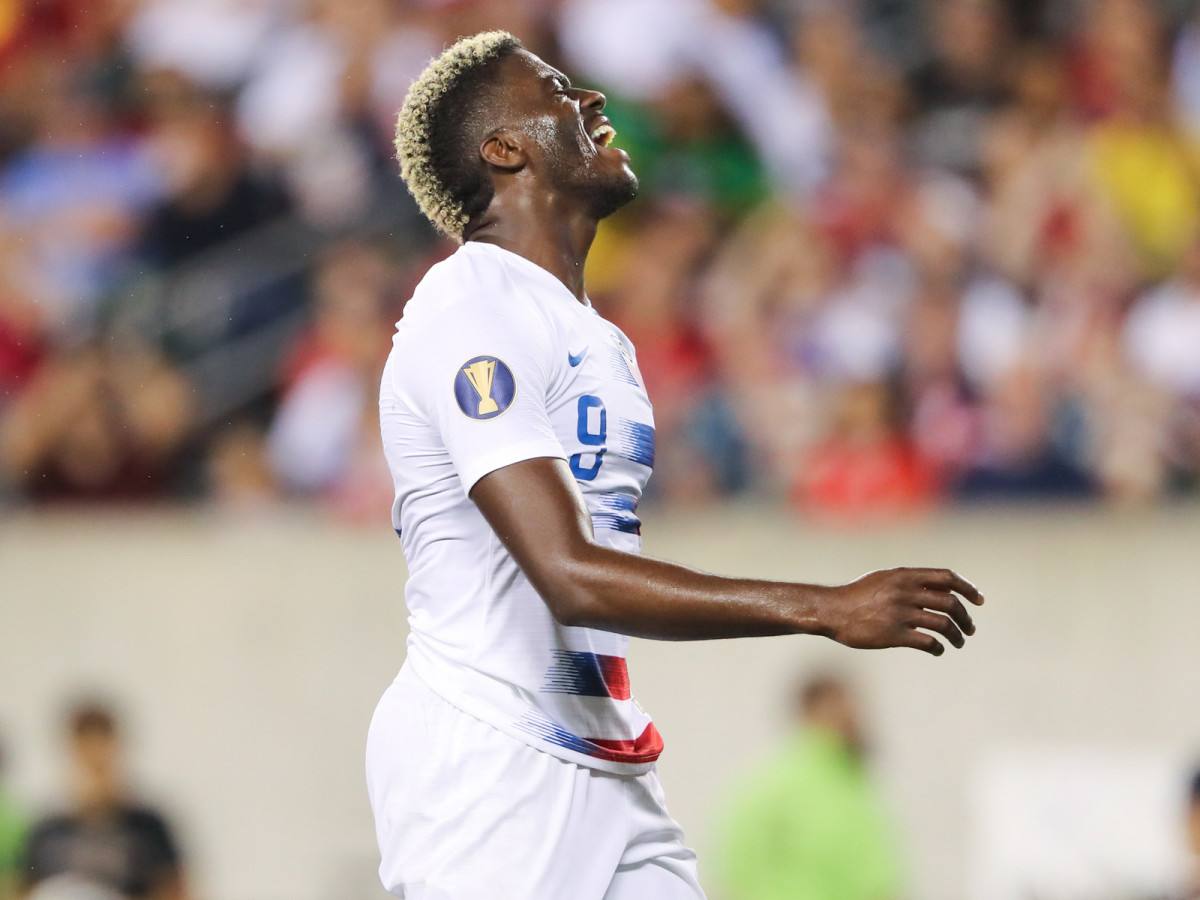USMNT Gets Away With Disjointed Showing vs. Curacao, Advances in Gold Cup

PHILADELPHIA — Against a more talented or more experienced team, the USA’s Concacaf Gold Cup run probably would’ve ended in Sunday’s quarterfinal. The Americans were disjointed and disconnected in some moments and sluggish in too many others, which kept tiny Curaçao—playing at this stage of the continental championship tournament for the first time—in it until the end here at Lincoln Financial Field.
But the USA wasn’t punished. Instead, coach Gregg Berhalter’s men will live another day, escaping with a 1-0 win that sends them to Wednesday’s semifinal against Jamaica. Midfielder Weston McKennie’s first-half header was the difference in a game the USA deserved to win only because of that single play. Otherwise, it accomplished little, and that’ll raise concerns ahead of a Nashville showdown that will be the Americans’ stiffest test of this tournament.
Here are three thoughts on the match:
Pulisic, McKennie provide the only highlight
Christian Pulisic said Saturday he expected a “whole section” of the Linc to be occupied by family and friends, since he grew up about 90 minutes away in Hershey. He wore the captain’s armband for just the second time in his national team career. And not surprisingly, he looked energized at the start. A long dribbling run from midfield in just the second minute resulted in a shot that Pulisic pulled wide left. Two minutes later, he stretched backward to get his left foot on Paul Arriola’s cross and forced an acrobatic save from goalie Eloy Room.
It was a sign of the frustrating evening to come that the USA’s advantage dissipated over the next few minutes, but in the 25th, Pulisic created the goal the hosts needed. Left back Tim Ream had the ball near the sideline and spotted Pulisic making a run toward the corner flag. Pulisic collected Ream’s pass and cut back toward the top of the penalty area, and the ball-watching Curaçao defense left McKennie wide open on the right post. Pulisic’s delicate cross was perfect, and McKennie had an easy header.
The Pulisic-McKennie connection gives the #USMNT the lead
— SI Soccer (@si_soccer) July 1, 2019
(via @UnivisionSports) pic.twitter.com/JUjV7dMsPs
“Any time I get to step out with this team, and obviously today I was able to captain the team, I just really wanted to show the team that I was there. I wanted to lead the team right from the start,” Pulisic said of those early moments. “I wanted the team to gain some energy off that. I just wish we could’ve put away a few more chances in the beginning, myself as well. In the end, we got the win.”
Along with their teammates, the pair—good friends despite their places on opposite sites of the fierce rivalry between Pulisic’s former club Borussia Dortmund and McKennie’s Schalke 04 (which extended his contract Sunday)—endured a difficult rest of the evening. Pulisic’s early activity never filtered down to the rest of the American attack, and McKennie had far too many giveaways for a player with his responsibility in the middle of midfield. But their one moment of quality was enough to deliver the USA to the semifinals.

The Americans were poor
After giving his first-choice players a break in the group-stage finale against Panama, Berhalter sent out the same starting 11 against Curaçao that he used in the team's first two Gold Cup games. Both were easy U.S. wins. Somehow, however, that same group struggled mightily here, frequently looking like players who had never played together.
The attack was static, and the runs behind defenders or in the channels that are designed to pull opponents apart were rarely present. Where there had been proactivity, there was uncertainty—or just way too much standing around. Right winger Tyler Boyd, who was outstanding against Guyana and Trinidad & Tobago, was totally out of sync, while Pulisic, Gyasi Zardes and Michael Bradley often were left to freelance or chase the game. Zardes, who relies on service close to goal, received almost none. He took only two shots.
“Congratulations to Curaçao. I think we should talk about that. They played an excellent game,” Berhalter said. “We had the opportunity early to put a couple goals in, and we didn’t do that. And we kept them hanging around. Then they were very compact, and for us, it was about moving them out of position. Their midfielders were man-to-man against Weston and Christian, and our job was to move them out of position to now find Gyasi or find one of our wingers in the pocket. Especially in the first half, there were times when that came off and it was O.K., and just times when there wasn’t enough movement to execute that.”
When the ball turned over, Curaçao often was able to find a pass that unsettled the USA, as space opened up between the midfield and back four. Remarkably, the unheralded visitors outshot the Americans, 15-10, and won the possession battle (52.4%-47.6%). The numbers tilted toward the visitors in the second half as Berhalter abandoned the mostly ineffective press in favor of preserving energy, and the lead, and allowing Curaçao take shots from distance.
It almost backfired. In the 84th minute, Curaçao midfielder Leandro Bacuna held off Bradley just enough to send a curling shot toward the corner of the net that an alert Zack Steffen managed to tip over the crossbar. The USA preserved its four-game Gold Cup shutout streak, but it was that close to having to play extra time.
“Not every game is going to flow perfectly,” Pulisic said. “They were very calm. They were very calm with the ball. They moved it really well. They built out of the back well. They made us defend a lot, and it was tough. Like I said, in the end, we need to finish more chances towards the beginning of the game to make it easier on ourselves, but we’re on to the next one.”

The USA will have to be better Wednesday
It’s simple: a performance like this won’t be good enough against Jamaica, which now has the experience of two consecutive Gold Cup finals under its belt, and which defeated the USA in a pre-Gold Cup friendly. Jamaica's players have the technical ability and confidence to exploit mistakes that Curaçao couldn’t take advantage of to the fullest extent.
“Jamaica has quality. They’ve always had quality, especially in their attacking positions,” Berhalter said Sunday.
With only two days of rest, Berhalter will have to decide whether he’s willing to stick with the same struggling 11 in Nashville. Perhaps it’s time to start Jozy Altidore, who scored the only goal in the 1-0 win over Panama. His movement and hold-up play might have a domino effect on the rest of the attack.
Berhalter will have to come up with a way to jumpstart his side against a Reggae Boyz squad that won’t let the Americans get away with an effort similar to the one they displayed here in Philadelphia.
“An interesting thing about this game, when you look both at Copa América and at Gold Cup, these quarterfinal matches, they’re all tight matches,” Berhalter said. “You guys wanted us to go out here and beat them 5-0, but we knew it was going to be a difficult game. You look at all the quarterfinals so far in this tournament and in Copa América, they’re all tough games. They know there’s no tomorrow if they lose.”
